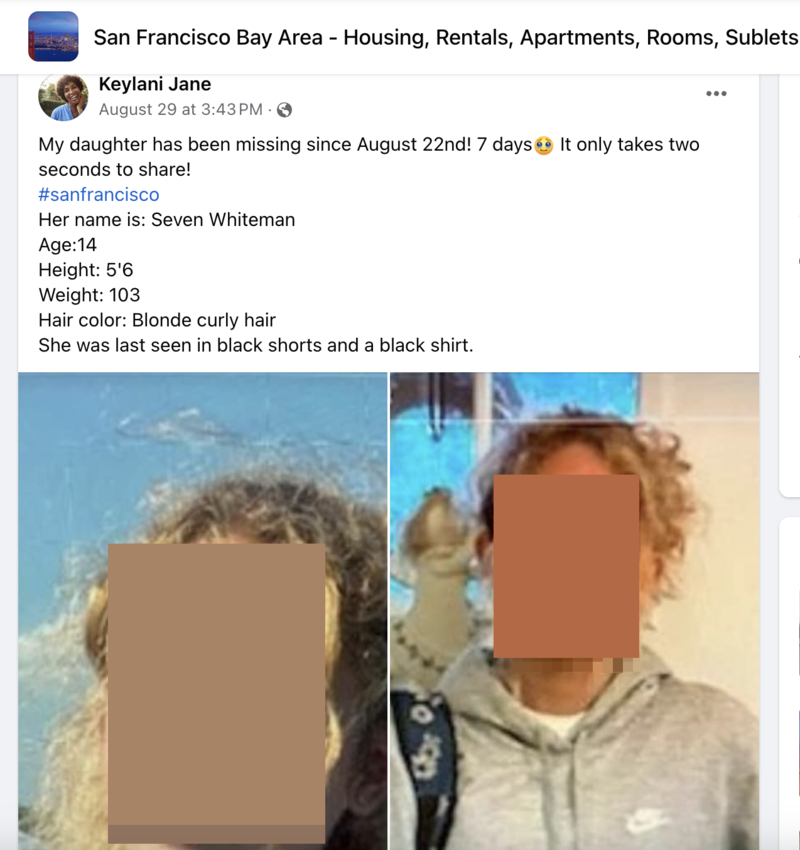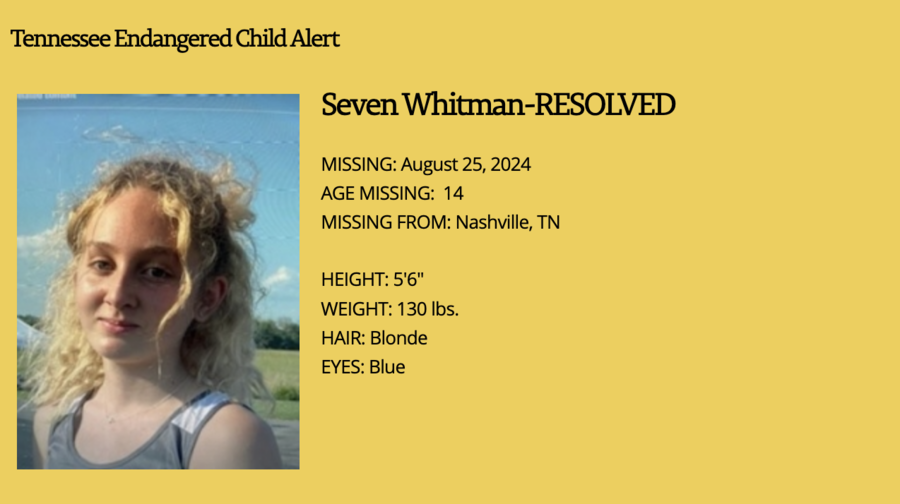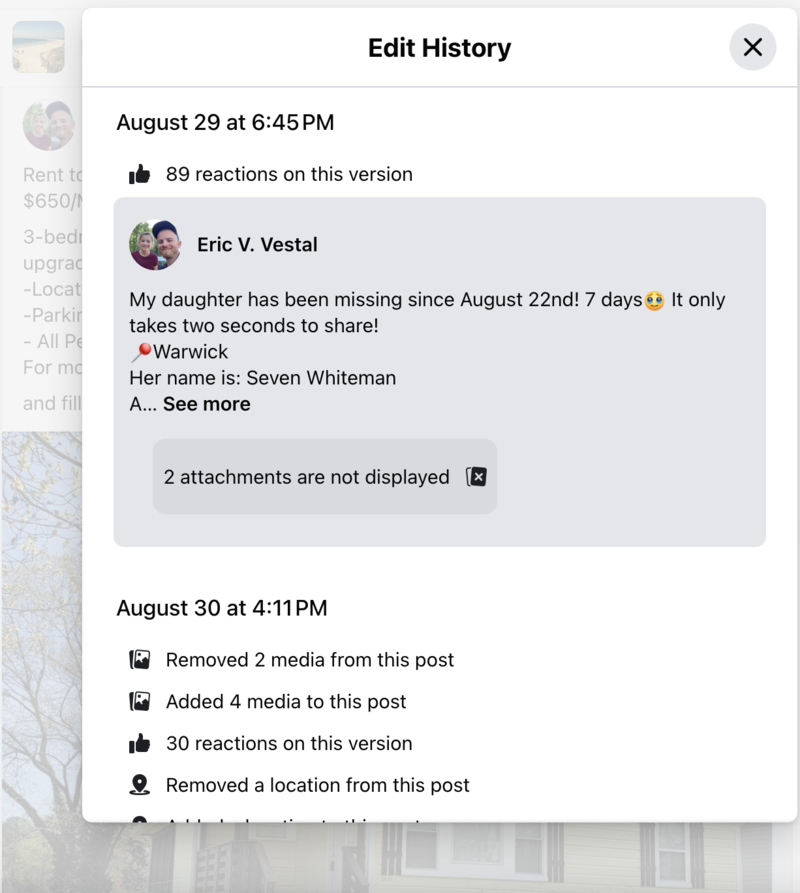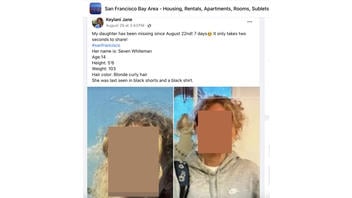
Are social media posts about a teenager named "Seven Whiteman," who supposedly went missing in several locations simultaneously, authentic? No, that's not true: This bait-and-switch post flips to a real estate ad. While the teen in the post's photos is a real girl who went missing, she was found on August 28, 2024, and was missing only in Tennessee.
The claim appeared in a post (archived here) on Facebook on August 29, 2024. Above two images of a teen girl with European features and curly blonde hair, the caption said:
My daughter has been missing since August 22nd! 7 days🥹 It only takes two seconds to share!
#sanfrancisco
Her name is: Seven Whiteman
Age:14
Height: 5'6
Weight: 103
Hair color: Blonde curly hair
She was last seen in black shorts and a black shirt.
One of the images in the post uses a photo of Seven Whiteman seen in police and Tennessee Bureau of Investigations tweets below that used the same image. The second appeared in local media coverage of Whiteman's disappearance, including an August 28, 2024, broadcast by CBS affiliate WVLT in Knoxville, Tennessee (archived here). Lead Stories has concealed Whiteman's face since she is a minor.
This is what the post looked like on Facebook at the time of writing.
(Source: Facebook screenshot taken on Fri Sept 6 14:37:29 2024 UTC)
A search of Facebook using the keywords "Seven Whiteman" and "It only takes two seconds to share" from this post yielded multiple posts listing different locations with the same photos.
The locations show the teen supposedly in at least two different countries. One post lists the location as Clifton, a village in the City of York, in North Yorkshire, England. Another post lists the location as Macoupin County, Illinois, on August 29, 2024, the same day the post in which this claim appeared lists the location as San Francisco.
A Google Lens reverse image search (archived here) of one of the photos brought up a page on the Tennessee Bureau of Investigations website titled "Tennessee's Missing Persons."
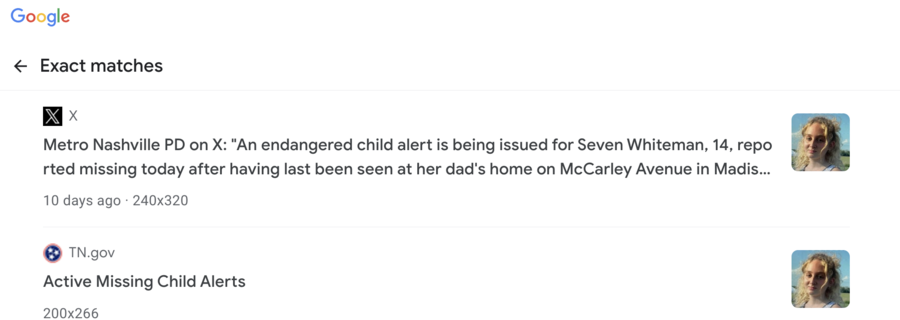
(Source: Facebook screenshot taken on Fri Sept 6 15:15:29 2024 UTC)
This page lists Seven Whitman, the 14-year-old girl seen in this post. While the page confirmed that she is a real teenage girl who went missing on August 25, 2024, it also reported that her case has since been resolved and that she went missing from a single location, Tennessee.
(Source: Facebook screenshot taken on Fri Sept 6 23:43:22 2024 UTC)
A WSMV-TV article (archived here) reported that the teen initially went missing from Nashville, Tennessee, and was found safe on August 28, 2024.
In a separate search for "Seven Whiteman" posts on Facebook, Lead Stories discovered a post (archived here) advertising a rent-to-own home purportedly located in Rhode Island. The edit history of this post shows that it first displayed the claim of the missing teen before flipping to a real-estate advertisement.
Three dots in the upper right corner of a Facebook post open a menu for a social media user to view its "edit history." The edit history opens as a pop-up window, displayed in the image below, showing if the post has changed and when.
Although the original photos of the teen girl are not visible, the edit history shows that a day after the post was made, two attachments were removed, and four were added.
(Source: Facebook screenshot taken on Fri Sept 6 15:30:29 2024 UTC)
Real-estate scam postings
In a previously published August 14, 2024, fact check, which debunked a similar bait-and-switch claim, Lead Stories defined what real-estate scam posts are:
Real estate scam posts are a tactic used on Facebook by spammers that employ 'bait-and-switch' content to lure people into a scam. A post's creator will pair an alarming or heart-wrenching claim with a compelling image to catch people's attention -- missing children or aging adults, injured animals, injured people in hospital beds, and sex trafficking tactics -- and drive engagement.
Once a post has garnered sufficient attention, the content switches to push a deceptive real estate advertisement. The wording and images of these eye-catching posts, typically seen on local Facebook 'yard sale' pages," are frequently identical, even when the offered property is located in different cities, regions of the U.S., or countries.
The content switch is documented by a post's edit history, which also notes additions or deletions of content. Sometimes, time stamps on the posts indicate when the switches were made, but timestamps don't change on some posts even though the content does.
Commonly, such posts use links that lead to landing pages with disclaimers or false promises and contact information requests that can be used to gather personal data, including financial information, from people who follow the trails.
Some links purport to connect people to a U.S. Housing and Urban Development site to help them search for deals on foreclosed homes. Lead Stories found that the links lead to new sites with disclosures at the bottom of the page that note they are 'not affiliated with, endorsed, authorized, or approved by the Federal Government or the US Department of Housing and Urban Development.'
Additional Lead Stories fact checks about bait-and-switch scams can be found here.

